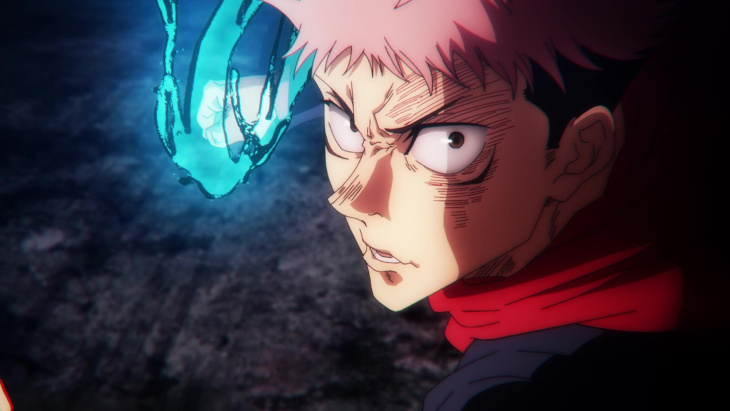
“I don’t know how I’ll feel when I’m dead. But I don’t want to regret the way I lived!”
Jujutsu Kaisen first started airing during fall of 2020. I didn’t write any first impressions reviews for that season, but I believe, had I done so, I likely would have written positively, but not overwhelmingly so, about Jujutsu Kaisen’s premiere. That sense remains relatively true of the show as a whole. There is a lot to like in this show, from its beautiful action, to its sharp humor, to its distillation of the best qualities of nostalgic shonen series. However, this is slightly undermined by two factors. The first is that the aforementioned humor and wacky qualities can sometimes feel at odds with the darker aspects of the series, and the second is that it never quite finds an area in which the show excels. Ultimately, while I looked forward to watching Jujutsu Kaisen each week, and would highlight it as one of the best shows of the winter anime season, I cannot shake the feeling that it was just one step away from truly elevating itself the way Demon Slayer and The Promised Neverland season 1 did.
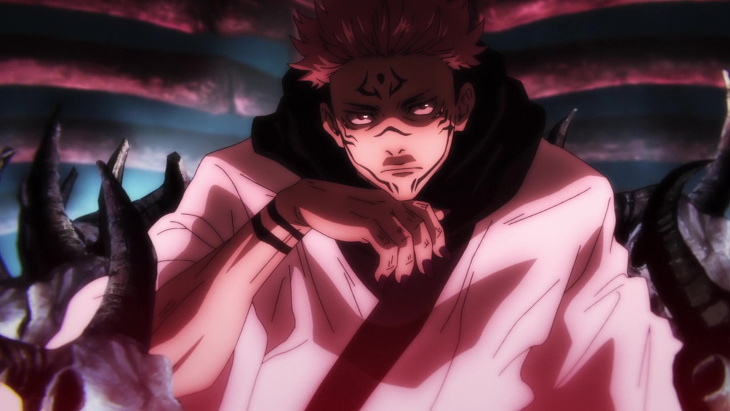
The story follows Itadori Yuji, a high school student with shocking physical capabilities who joined his school’s Occult Studies club mostly because he liked the members and because its lax requirements allowed him to visit his ailing grandfather after school. When his classmates unwittingly unseal a powerful cursed artifact, Yuji is forced to become host to the powerful cursed spirit Ryomen Sukuna. Initially, the relationship between Yuji and Sukuna seems like it will be a central dynamic which is constant throughout the show, but this turns out to not really be the case. Sukuna only shows up occasionally, and as the season went along, these instances became less and less frequent. In fact, I can only think of two instances in the latter half of the show where Sukuna made an appearance. The reason I find this a little frustrating is that Sukuna doesn’t have to take possession of Yuji’s body to interact with others. He’s shown to be capable of opening up mouths in Yuji’s flesh from which he can speak, so his lack of involvement seems a bit strange. The real basis of the character dynamics come from Yuji’s relationships with his classmates after he’s inducted into Tokyo Prefectural Jujutsu High School for the purpose of training to combat cursed spirits and track down the remaining fragments of Sukuna’s power so he can be eliminated.
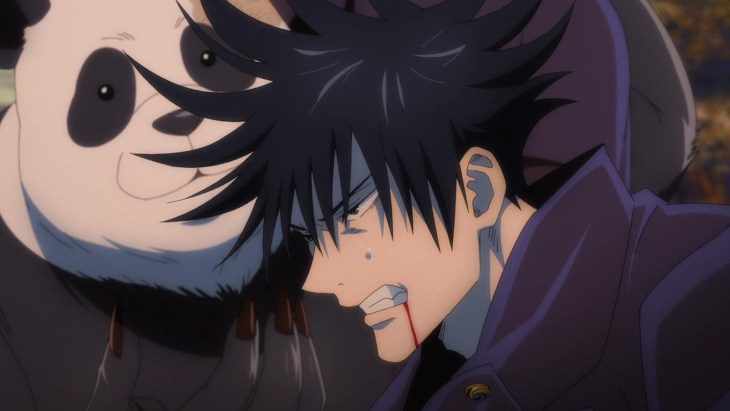
I like the characters Jujutsu Kaisen, but they have a habit of bumping into such issues as suspension of disbelief and tonal dissonance. I’ve argued in the past that some manga writers have a habit of failing to say no to an idea, leading to what I refer to as “dumping ground” series. Tite Kubo’s work often exemplifies this, with Bleach being one of the most prominent examples of this type of writing, as it featured characters with absolutely ridiculous powers and abilities which felt entirely divorced from one another, but lacked the fanciful and comedic tone of a series like One Piece which would be needed to tie those characters together into a cohesive story. Jujutsu Kaisen never reaches that level, but this is one of those shows where two major recurring characters are a talking panda and a sorcerer robot. The series ultimately explains why these characters make sense, in universe, but it takes its sweet time to get to that point. I was frankly unsurprised to learn that Jujutsu Kaisen‘s mangaka, Gege Ikutami, sometimes starts off with the visual concept for a character and that this extended to Panda specifically. There are about 10 episodes in between Panda’s introduction and the explanation of what he actually is, and during that period he’s just a big distracting question mark. Still, while bizarre abilities can highlight some of the show’s dissonant tone, the characters are a lot of fun. Their wackiness can conflict with the often grim and dark horrors in a way that doesn’t entirely work for me, but it affords their personal interactions a wealth of humor to draw from. The dynamic between Yuji and Todo Aoi, a 3rd-year student from Kyoto’s Jujutsu Academy, is a particularly delightful source of comedy and action.
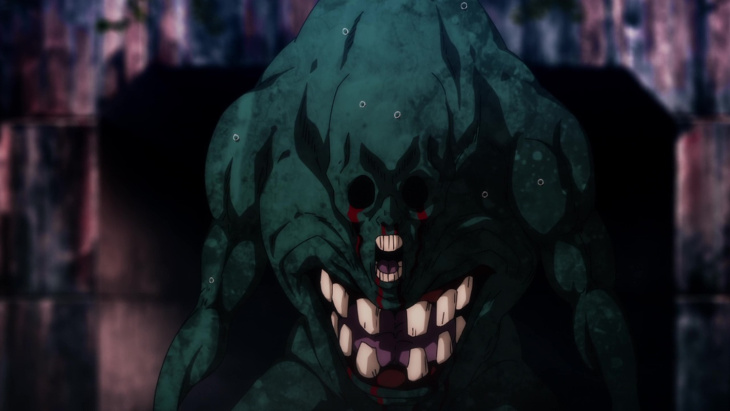
The main reason I harp on the peculiar implementation of the show’s comedy is because many of the enemies that appear in the series are legitimately horrifying. MAPPA did a brilliant job of animating the disturbing entities that Yuji and his classmates square off against. I’d go so far as to argue that some of the visuals bring to mind the works of Junji Ito, though that may be overpraising it slightly. Even so, I can’t call to mind a better point of comparison. The action is brilliant in its execution with fluid and dynamic movement. The narrative expresses strong instincts on how to pair its characters up in interesting ways, and the production takes the interplay between them and capitalizes on it. The openings are positively spectacular too, with the second opening being among my favorites in recent memory. I don’t think I skipped it at all during the course of the season, and I can see myself returning to it regularly.
Before I wrap up, a few Notes and Nitpicks:
- I’m curious whether my issues with the tonal inconsistency would extend to the manga. Sometimes it’s easier for a comic to make that 180-degree swerve from, say, talking about the act of coping with the aftermath of taking a life to having a wacky comedy bit about how an ally looked like he might be dead but was really just asleep. It’s hard to judge without having read it myself.
- In a weird way, I feel like Jujutsu Kaisen may have the inverse of the issues that 2.43 faced in this past season. Whereas 2.43 had its attention directed at its dramatic aspects to the exclusion of its sports action, Jujutsu Kaisen could have stood to offer a little more breathing room to the traumatic events that some of its characters experience. Itadori Yuji goes through a lot in these 24 episodes, and while he may be a bit of a simpleton sometimes, he’s not oblivious.
- I was rather busy when the fall 2020 anime season started, so Jujutsu Kaisen actually bears the distinction of being the only show from that season that I kept up with.
- It can be hard coming up with things to say about competent, well-made programs. It’s a nice problem to have though.

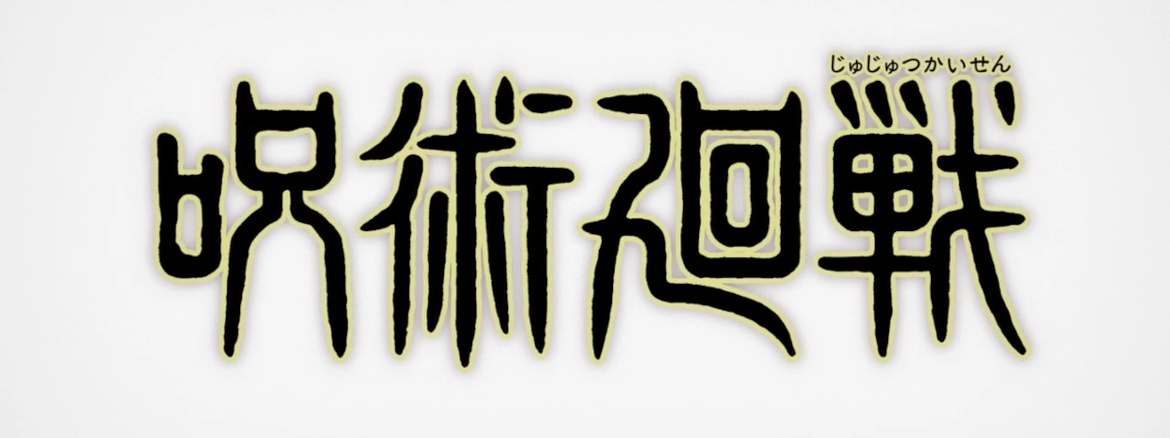


Add comment